Neil Peart's News, Weather and Sports
The Hour Of Arriving
NeilPeart.net, December 2007
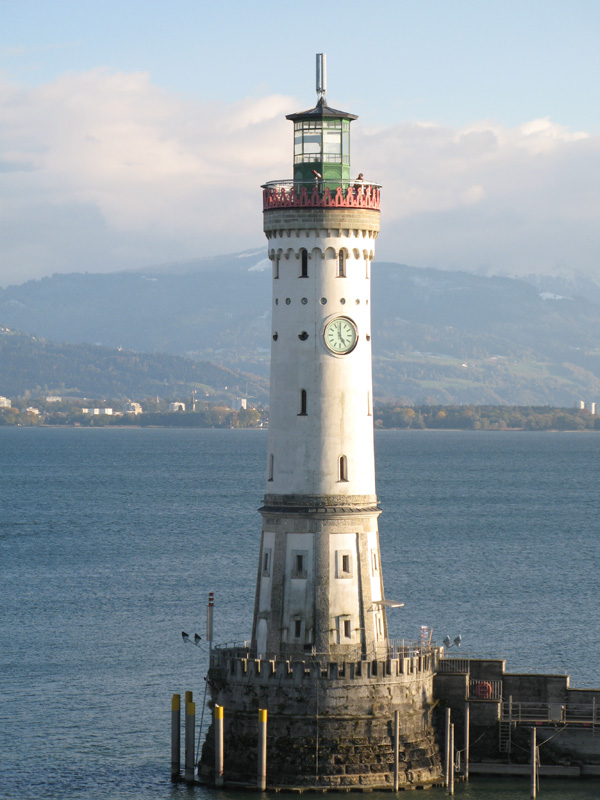
This lighthouse was the centerpiece of the view from the balcony of my room at the Hotel Bayerischer Hof (Bavarian Court) in the island-city of Lindau, Germany. On a large lake called the Bodensee, or Lake Constance, near the present-day borders of Germany, Austria, and Switzerland, Lindau's history dates to Roman times, growing from a monastery to a fortified city-state almost a thousand years ago. A fair-sized island - two-thirds of a square kilometer, or about 170 acres - today Lindau is connected to the mainland by a causeway, and the city retains a picturesque, medieval atmosphere.
The clock on the lighthouse shows that it was five o'clock - cocktail time - and that's what Brutus and I were celebrating. After a show the previous night in Oberhausen, we had slept on the bus in Mannheim, then unloaded the motorcycles and ridden 516 kilometers, 323 miles, through cold, snowy weather along the Bavarian Alps. Now we were settled into our spacious and comfortable rooms, with a magnificent view over the lake and across to the Austrian and Swiss Alps. At the western end of the lake, where the Rhine flowed out, the sun was still bright. We clinked our glasses and stood on the balcony taking it all in.
Perhaps my favorite part of a long day on the motorcycle is that first hour of arriving and settling into a hotel, whether humble or luxurious. It feels so good to pull up in front of the hotel, kick down the sidestand, and lift a weary leg over the saddle, still keyed up from the day's adventures, yet gradually easing into a more relaxed state of mind. I peel off my gloves, lift off the helmet, pull out the earplugs, and slowly stretch my back into an upright posture again. Brutus goes inside to see about our rooms, while I lazily open the aluminum luggage cases and unload my soft bags, unhook the duffle from my saddle, and unzip the tankbag, piling them at the curb. At a hotel sufficiently luxurious as to provide a bellman, such as the Bayerischer Hof, I'll load up the luggage cart (at our hotel in Scotland, the doorman looked at me blankly when I requested a cart - they call it a trolley). Piling on my gear, hanging my helmet from the crossbar, I'll start adding Brutus's luggage, too.
Once the bikes are parked, we find our way to our rooms and start the usual sequence of rituals. First unpack the dress-up-for-dinner clothes (suit and tie in Europe, black cotton shirt and pants in North America) and hang them in the bathroom, to let the shower steam out the wrinkles. Clean the helmet's faceshield with the "bug rag" I carry in my tankbag, and hang the grubby white cloth by the shower to be washed later, then draped over a chair to dry overnight (in plain sight, so you don't leave it behind - it's the kind of thing you miss when a bug splatters itself across the plastic in front of your eyes). Finally, spread the luggage bags across the bed and dig out the plastic flask of The Macallan.
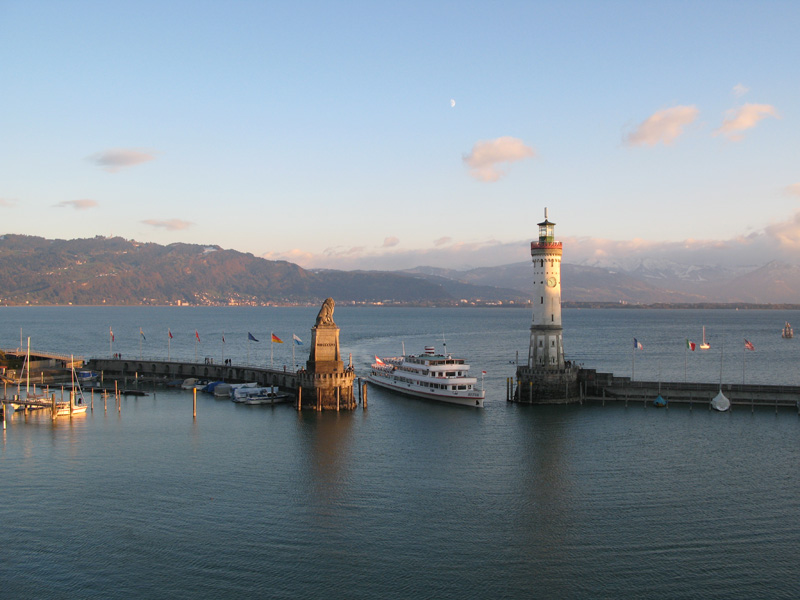
Brutus will come by my room with a bucket of ice, and I'll pour us each a glass, sometimes omitting the ice, on a cold day. (Once you've been chilled to the bone by riding in freezing weather all day, it takes a long time, and a hot shower, to finally feel warm again.) After toasting each other with a nod and a smile - a silent, shared tribute to the day, and to our continued existence - we admire the view, have a smoke, watch the tour boat come into the harbor, talk about some of the day's adventures and encounters, and look through the photographs we've taken. We settle on a time to meet for dinner, and go off to take care of our own chores.
Dinner is always a big event at the end of a long ride. (Like that line from Byron, "Much depends upon dinner.") Brutus and I usually skip lunch, preferring to spend that time riding, and so arrive at our destination earlier. By late afternoon, we will be ravenous, but the wait is especially well rewarded in Europe, where great restaurants are so much more common.
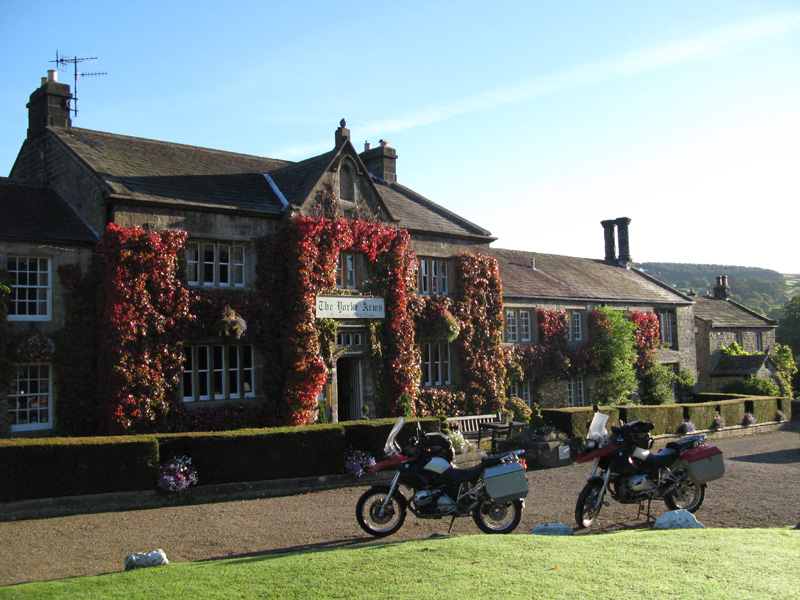
Even on our first night off in Europe, a week or so before visiting Lindau, we had ended our day at a fantastic place - the Yorke Arms, in northern England. The small hotel described itself as "A Restaurant With Rooms," and boasted a Michelin star, so even more than usual, its dining room was an important part of the destination for Brutus and me.
In my years of traveling to places both exotic and ordinary, I have had many bad journeys to great destinations, and plenty of great journeys to bad destinations. The latter occurs more often in North America, which is far too large and scattered to have the concentration of sophisticated accommodations that Europe can offer. But of course the journeys can be monumentally grand, especially in the West.
At the end of the North American part of the tour, my American riding partner Michael and I had a T-shirt printed up that listed ten American motels we had stayed at for less than $100 (some of them much less, but still nice enough, and I do love being able to park right in front of my room). The column of motels, towns, and prices appeared above the slogan, "That's The Way We Roll." While Brutus and I swanned around between luxurious hotels in Europe, we joked about making a T-shirt with a list of all the fantastic - and fantastically expensive - places we stayed there, followed by the slogan, "That's The Way We Roll."
Our ride to the Yorke Arms in North Yorkshire had been a long day, but it was one of those journeys where the miles didn't begin to tell the story. Anyone who has traveled much in Britain would agree that 221 miles (353 kilometers) is a substantial day's journey under any circumstances, but for Brutus and me most of those miles were on tiny roads, often only one narrow lane, further crowded by stone walls, hedges, and woodlands in crooked lines, with endless blind corners. Pheasants and grouse started up in front of us from the roadside cover, sometimes causing us to duck reflexively, and sheep were a constant menace. Plus there was the occasional Land Rover or farm tractor appearing from nowhere and occupying most of the road.
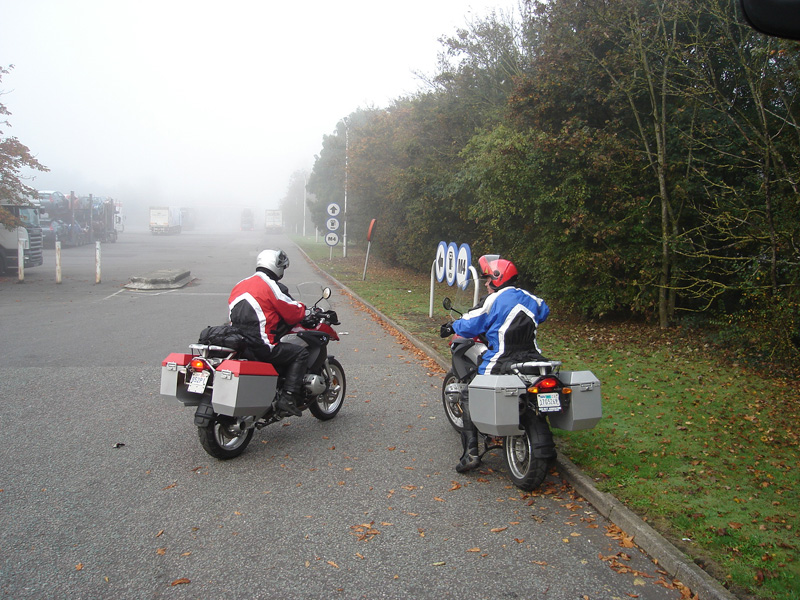 |
Setting off from the bus on a misty morning,in a British motorway services (photo taken by our bus driver, Mark, from his driver's seat) |
We had started that morning near Jedburgh, in Scotland, waking on the bus in a quiet lay-by. Our driver, Mark, cut the oranges in half while I squeezed the juice (into glasses we kept overnight in the freezer - a recent innovation of mine), the coffee fragrant as it poured from the excellent little machine that ground the beans for each cup. While I ate my cereal and bananas, Mark and Brutus unloaded the bikes, then we got dressed to ride and gathered our luggage.
That day we rambled down through the Lake District (as pictured in the previous story, "Above Lake Windermere"), and some curvy little roads across wide-open moorland, grassy and treeless, in the Yorkshire Dales. On a bright sunny day, the stone-built villages and walls, the winding lanes through spacious countryside, and the variety of scenery from woodlands to open moors had made for an exciting and enjoyable ride. To arrive at a luxurious country hotel, the Yorke Arms, in the hamlet of Ramsgill-in-Nidderdale (a church, the hotel, and a few cottages, all in stone) nestled in a lush valley, with a Michelin-starred restaurant, was the proverbial icing.
Brutus and I have a particular appreciation for good food, perhaps because both of us do a lot of cooking at home (though I admit with all humility that Brutus is the more intuitive and sophisticated chef - I'm just a recipe-follower). Along with our Alex, Brutus was the first man I knew who would spend hours preparing a meal for friends and loved ones - and it was from the two of them that I learned why: cooking is an expression of love. When Brutus visits me at my house on the lake in Quebec, if the weather is bad we might spend hours in the kitchen making ourselves an amazing meal.
For myself, it's only in the past ten years that I have taken any interest in cooking; before that I couldn't do much more than boil an egg. That process of learning and refining techniques in the kitchen parallels my comments about motorcycling and drumming in a previous story - many things can be learned that cannot be taught. (My friend Mike Heppner, a novelist and writing teacher, points out that writing is the same way.)
By gradually learning to prepare dishes that I liked to eat (and that pleased my wife), from fish, vegetables, and rice to key lime pie and chocolate cake, beginning to shop wisely and often (every day or two, in the European fashion), and moderate heat and time precisely (a recipe for good drumming, too: heat + time), I have built up a fair repertoire of simple meals.
That minor accomplishment not only impresses women no end, it has changed the way I look at a restaurant menu. Now I automatically dismiss anything I could make myself, and choose dishes that are difficult or especially time-consuming to make. The Yorke Arms menu offered a perfect example of this policy, as I ordered a scallop soufflé, roast grouse, and a chocolate soufflé (soufflés are famously one of the hardest dishes to produce successfully, and grouse is - well, not generally available in my neighborhood grocery store). The meal was absolutely superb, and a bottle of great burgundy, Echézeaux, was an ideal complement, finished perfectly by black coffee and a snifter of Hennessey XO.
The Yorke Arms experience was already a dramatic contrast to some of the utilitarian motels and humble meals Michael and I had resorted to in North America. Though at the time we had certainly appreciated those "hours of arriving" too, our destinations were more-or-less accidental, chosen because they were on our route, and it was time to stop. In Europe, Brutus was able to choose a great destination, then design a fantastic route to get there. It is hard to imagine how an establishment as sophisticated as the Yorke Arms manages to exist in the wilds of North Yorkshire, but Brutus and I were glad it did.
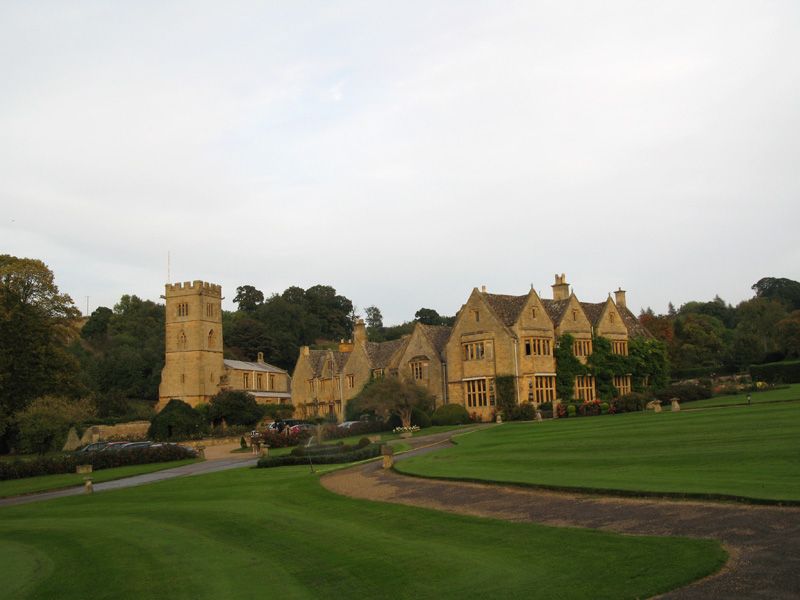
The next day off, between shows in London and Birmingham, carried us to another fantastic destination. After a long day's ride through the West Country, Devon and Somerset - part of Thomas Hardy's "Wessex" - along many more winding little lanes, we rode into the curving gravel drive of the Buckland Manor in the Cotswolds.
The evening light was golden on the gardens and the manor house (my room on the front right, top floor) and neighboring chapel. Built from the famously buttery local stone, parts of the building dated back more than a thousand years. At a place like that, we would carry our drinks with us and go for a walk, take some photographs, and feel good about life.
Another unforgettable overnight stop was the Bühlerhöhe Schlosshotel in Germany's Black Forest (described glowingly in Roadshow). During that same magic hour after arriving, I made a journal note expressing my awareness of these contrasts in my life.
Sometimes I can only laugh.
After today, last night, the last two days - almost too much.
But really just enough.
By that I was trying to reconcile playing two hard shows in Rotterdam, filming for a concert DVD with the attendant pressure to play well, feeling good about having captured two decent performances on those nights (a little extra sore, too), then sleeping on the bus and waking up to ride all day on the challenging roads of southern Germany and the Black Forest, and finally arriving at a truly magnificent hotel - where I had been given the ridiculously large, ornately decorated Presidential Suite. Brutus and I guessed that upgrade was due to our stay at that same hotel last tour, when we had complained (okay, I had complained) about not being able to get a reservation in the main restaurant. Perhaps they'd made a note that they "owed us one." In any case, after those action-packed days and nights, to stand in that palatial suite and look out at the breathtaking view was indeed "almost too much. But really just enough."
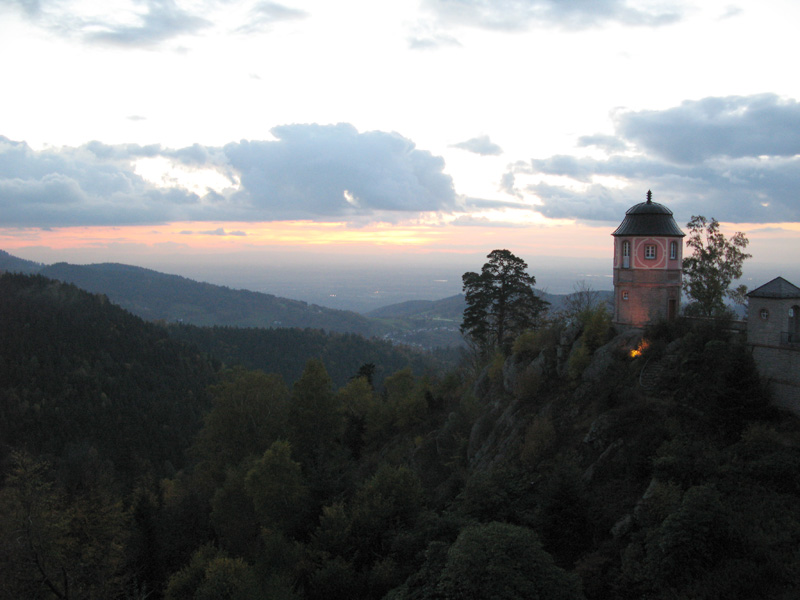
Clearly, this was not a scene to be taken for granted, and in the same way the view from my balcony in Lindau had fascinated me, I kept watching as the sky changed. Again and again I picked up my camera and tried to capture the ultimate sunset over the Black Forest, the Rhine Valley, and, in the far distance, the low Vosges Mountains of French Alsace.
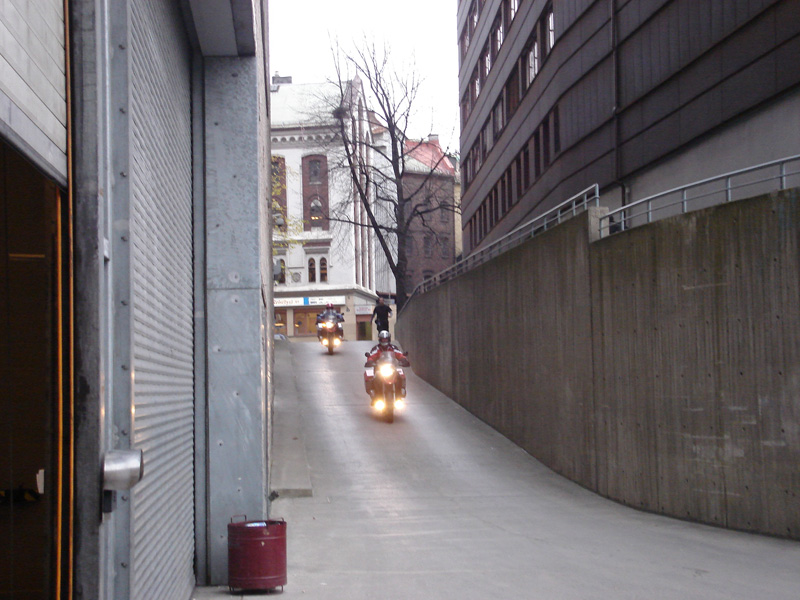 |
The Hour of Arriving 2 - Brutus follows me into the arena in Oslo, directed by Michael at the top of the ramp (photo by Mark) |
That evening, I contemplated a title for a story about such contrasts, "Europe Is Different." With the intended irony of understatement, that title seemed to hint at a whole host of differences between traveling in North America and Europe. Under the title, I added a wry parenthesis, "(plenty of eggs go in that basket)," and I was certainly thinking of good eggs. As I wrote in Roadshow, referring to Brutus's and my European travels on the R30 Tour in 2004, "Europe has ... seduced me."
On a show day, the hour of arriving is completely different. It is not the end of the day's labors, but merely the beginning. Not least, there's still a three-hour show to perform. Soundcheck at 5:00 is the first "scheduled activity," but there is always plenty to do before that. We like to arrive between two and three, after pausing just before we pull up at the venue to call Michael (who handled security in Europe) and let him know our ETA. Michael will advise us on the easiest way into the building or parking area, and he or his associate Kevin (former Canadian soldier, now firefighter and computer forensics expert in Calgary, Alberta, moonlighting as Michael's fellow Praetorian for the European tour) will meet us out front to wave us in.
The amphitheaters in North America are the nicest to arrive at, because they are usually in rural areas, so we don't have to fight through city traffic, and because they have a private, enclosed area for the buses and trucks, so I am able to walk freely from bike to bus to backstage anytime I want. The arenas in North America and Europe are usually in the middle of a busy city, and the buses and trucks are often parked on the street or in a public area. There is no privacy for me outdoors, so if I want to, say, change the oil in my bike, it takes some ... logistical strategy - like at the Ahoy in Rotterdam.
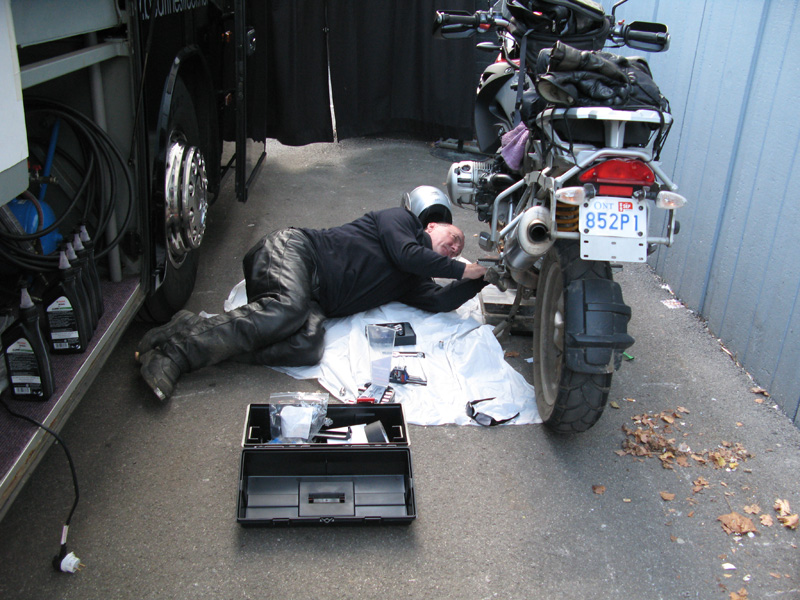 |
Afternoon oil change in Rotterdam - "Do not look behind the curtain!" |
Before Brutus and I arrived, Michael had Mark park the bus close along a wall near the backstage entrance, then arranged to have some free-standing curtains from the building placed at each end of the bus, between it and the wall. When we rolled up, Kevin pointed me behind the bus and trailer, and pulled back the curtain at one end for me to ride through. Thus I had a private area to work on the bike, hidden from gawkers, rockers, talkers, and stalkers. (An audience is very good to have when you're performing, but not so much when you're lying on the ground changing your oil.)
In its way, that first hour at work is almost as special as it is on a day off. It is not so pleasurable, of course - it's work, and there is more urgency to get things done, take care of business - but there is time for all the chores, and that is satisfying in a "practical" sort of way. Carry the luggage onto the bus, unpack the dress-up clothes and hang them in the locker, clean off the faceshield and hang the rag to dry - beside the salt-stained stage clothes from the previous show, dry now and ready to give to Donovan for cleaning, so they are shoved into the "gig bag" with my used towels from that show, and my drumming shoes (actually dancing shoes, inspired by my teacher, Freddie Gruber. When I first studied with him, back in 1995, he shook his finger at me and said, "Don't play drums in sneakers!" Freddie's method was centered on teaching me to dance on the drums, so I tried some soft-shoe dancing shoes, and now I can't play properly without them).
I leave that bag by the bus's door, ready to go inside later, then gather the tools, oil, filter, and rags to do the oil change. Twenty minutes later, with Brutus now working on the other bike, I have the pleasure of washing my dirty hands and noting the mileage in my journal (especially satisfied when the interval is close to my target of 3,000 kilometers between changes).
Then on to check phone messages, skim through accumulated e-mails, maybe have a shower and a nap, and before I know it, it's soundcheck time. Then dinner with the guys at work, a bit of quiet time to phone Carrie, read, even close my eyes for a few minutes, then fifteen or twenty minutes on the little warmup drumset, change into stage clothes, and on to another show ...
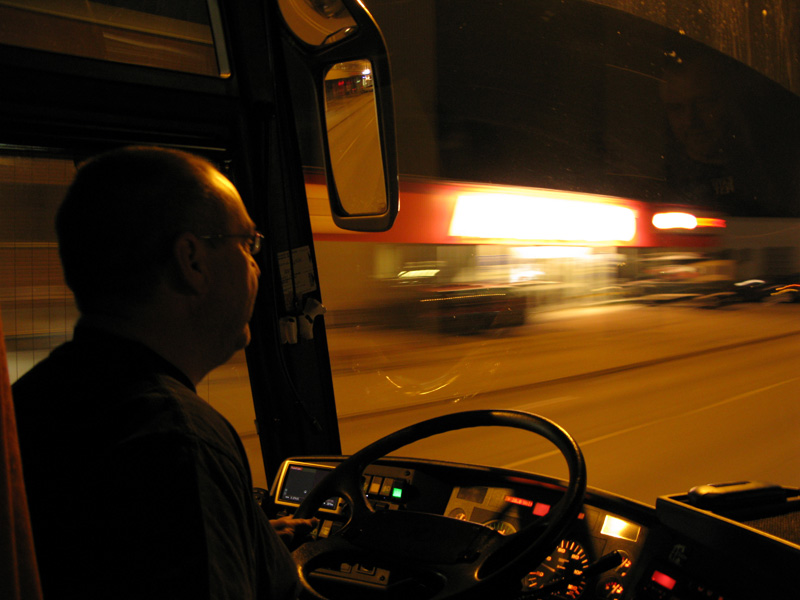 |
Mark driving into the night after a show |
When the show is over, there is another kind of hour of arriving. As the bus drives away from the venue, and I change out of my sweaty clothes and into pajama bottoms and a T-shirt, then sit in the front lounge to enjoy what I called in Roadshow, "my humble workman's rewards: a glass of booze and a smoke," there's a similar feeling of keyed-up peace that only lasts a little while, but feels pretty good.
The nature of the reward at each of those hours is the feeling that you have traveled a long way to get somewhere, and now you're there. Such a feeling is necessarily transitory, because all too soon you're on your way to somewhere else - another ride, another hotel room, another show. But when that destination is home, and you've got more than a few days to spend there, that hour of arriving can open into a delightful passage of unfenced time.
As if a long-held breath has been released at last, tension eases, fatigue slowly melts away - one muscle group at a time, it often seems. After about two weeks of rest, I notice that one shoulder will ache for a day, then the other one, then a daily succession of forearms, biceps, quads, calves, and elbows. Likewise, the split calluses on my fingers start to itch a little as they heal over, and my hands don't look and feel so inflamed and swollen all the time.
After the past two years of more-or-less steady work, recording and touring, there are practical matters to attend to as well - like visits to the dentist, which may not be delightful as such, but need to be addressed. Along with getting cars serviced and mail sorted, I am able to provision my long-neglected kitchen with all the fresh and varied ingredients I might need to "feed inspiration" - onion, garlic, dill, tomatoes, multicolored peppers, lemons, that sort of thing. Just to have them on hand, so that while I'm cooking, if I think, "hmm, some fried onions would be good with this," I can do it.
There is time for indulgences, too, like writing these stories. (I have decided to define them as a combination open letter and "meditation.") I'm not sure what they're "for," or where they're leading me, but I enjoy the process, and I can do it.
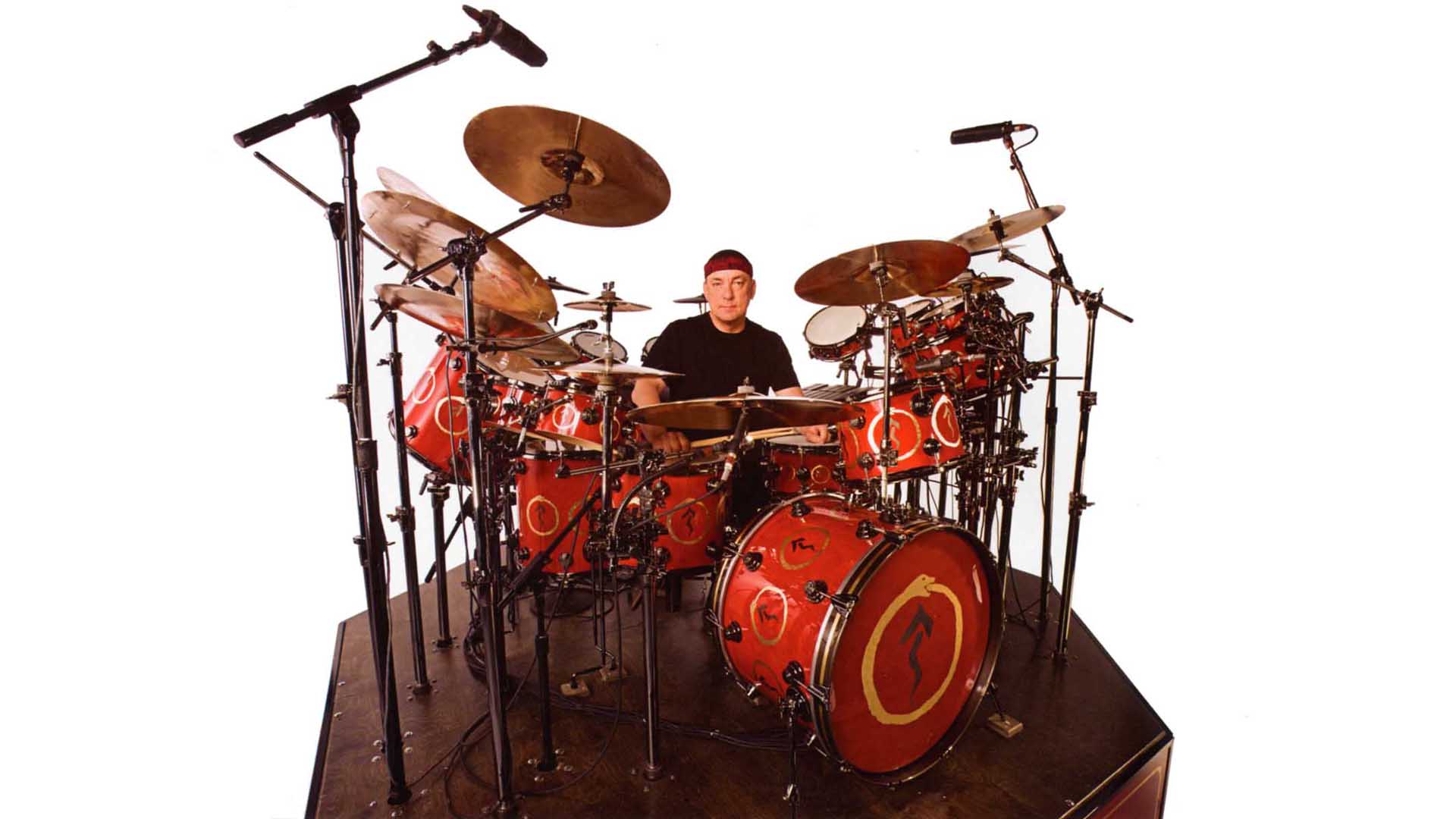
Likewise, I have ordered 100 postcards, with a picture of me and my drums on the front, intending to write and mail one as a "thank you" note to each of the people who sent me gifts on this tour. (Inevitably, as I traveled around and collected so many cards and letters in the dressing room case, on the bus, and in my luggage, some of them went astray - like the card from the "friendly Floridian," for example - so I apologize to anyone I missed, and thank them now.)
Back in April of this year, just before the Snakes and Arrows tour, I did a TV interview for the Canadian music channel, MuchMusic. The cameraman placed the interviewer and me in the rehearsal hall, in front of my drums, where I had been laboring for several weeks by then. Some of the interviewer's questions seemed to angle toward a certain starry-eyed view of my work, especially the touring side of it, and I tried to explain to him that I didn't consider touring, or even drumming, to be my life.
He seemed perplexed, and to appraise me as clearly jaded and cynical, because his next question was, "When did you start to feel that way?"
I paused to think for a couple of seconds, then was glad to feel the mental light bulb illuminate a true and clear answer. I was able to answer honestly, "About a month into the first tour, in 1974." That really was when I started to feel that touring was "not enough," and turned to reading books as a way to make more use of the days and nights.
Partly out of sheer contrariness, but partly out of a desire for context, I often refer to playing the drums, with deliberate disrespect, as "the job" - hitting things with sticks. Obviously it means much more to me than that, and has been a central focus in my life. But still, it seems rather sad to hear anyone say that their work is their life.
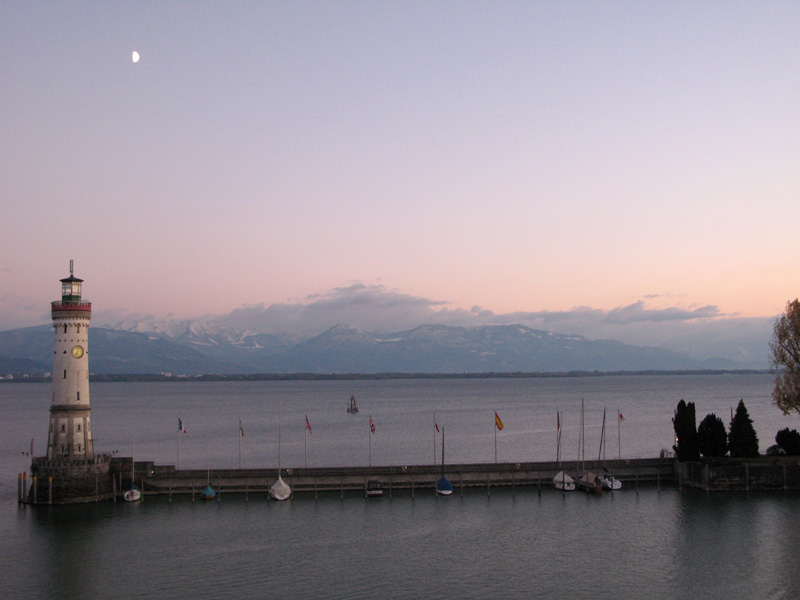
Not family and friends? Not reading and writing? Not hiking or cross-country skiing or birdwatching or motorcycle riding or swimming?
Just work?
I don't think so.
Earlier in the tour, when we played in Portland, Oregon, someone in the audience had apparently seen that interview, and ventured to disagree publicly with my opinion on the subject of my life. Far back on the stage-left side of the house I saw a large sign, in big block letters, "NP - THIS IS YOUR LIFE."
Well, thanks, but no thanks.
Of course it's just my opinion, but to me, my life is not dedicated to the place, but to the journey, and to the hour of arriving.
All the while knowing that, all too soon, there will come the hour of departing.